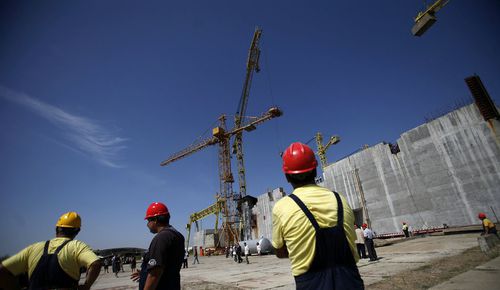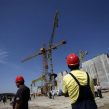
Russia’s Bullying Backfires in Bulgaria
Publication: Eurasia Daily Monitor Volume: 9 Issue: 170
By:

A row between Bulgaria and Russia over compensation for the scrapped Belene nuclear power plant (NPP) project threatens to delay the start of the South Stream gas pipeline, the Kremlin’s strategic energy corridor intended to bypass Ukraine in supplying Russian gas to Europe. On the eve of signing the final South Stream investment agreement between Bulgaria and Russia, Rosatom’s subsidiary Atomstroyexport increased its initial claim of 58 million euros ($75.5 million) (from 2011) to 1 billion euros ($1.3 billion) for incurred project expenses and inflicted losses over the termination of the Belene project. The case will be decided by the International Court of Arbitration in Paris (BTA, Trud, darikfinance.bg, September 11).
Russia’s tactics of bullying its partners and former Soviet satellites have apparently backfired in Bulgaria. Using Soviet World War II rhetoric, the Bulgarian Prime Minister Boyko Borissov called the lawsuit “a treacherous attack,” while President Rossen Plevneliev openly spoke of Russia’s attempt to blackmail Bulgaria to sign on to South Stream (Trud, September 11). Borissov even threatened that Russian President Vladimir Putin would experience a “very unpleasant visit to Bulgaria on November 9,” when the two countries are scheduled to sign the South Stream agreement. Finance Minister Simeon Dyankov vowed that Bulgaria would fight Atomstroyexport in court and win the battle. “We have shown that we are not afraid of the Russians,” he declared. Sofia has hired White & Case LLP to represent Bulgaria’s National Electric Company (NEC) in Paris (BGNES, Trud, September 12; Capital, September 14).
In the meantime, the opposition center-right Blue Coalition advised the government not to sign on to South Stream until the claim is resolved. The coalition saw a connection between Russia’s demand for compensations and the request for a referendum on Belene submitted by the Bulgarian Socialist Party in parliament. On July 27, the Socialists filed a petition with over 770,000 signatures in support of a referendum on the Belene NPP (Trud, September 13).
Bulgaria abandoned plans to build its second nuclear power plant on the Danube River in March 2012, mainly because of its high cost, inability to attract a major Western investor, and Russia’s unwillingness to share the financial risks of the project. Atomstroyexport, the leading Russian company in implementing intergovernmental agreements on constructing nuclear facilities abroad, was contracted in 2006 by the previous Bulgarian Socialist-led government to build the nuclear plant for 3.99 billion euros ($5.19 billion), but the company later increased the price to 6.3 billion euros ($8.2 billion). The real cost for the plant would have been 10.35 billion euros ($13.47 billion), according to an economic feasibility study conducted by HSBC in 2012, an expense Bulgaria could not afford without substantial Western investment. At the time of the cancellation of the project, one of the nuclear reactors was already built and Bulgaria had paid for most of its expenses. The government said this reactor might be installed at the existing nuclear power plant at Kozloduy or sold. Bulgarian and Russian officials assured that all outstanding financial obligations between the two countries would be resolved amicably (see EDM, April 2; novinite.com, April 23).
Atomstroyexport insisted, however, that it was never informed about the cancellation of the project, even though the news made international headlines in March. The company claimed it continued working on the second reactor for Belene until September 2012. The Bulgarian Ministry of Economy informed the public that the NEC and the Russian company have been negotiating the cancellation of the project and any outstanding payments for months; therefore, Atomstroyexport was aware that the project was de-facto cancelled (Capital, September 14).
Sofia’s anger with the Atomstroyexport lawsuit was evidently heard in Moscow. Putin’s press secretary Dmitriy Peskov was quick to announce that the agenda of the president does not contain a November 9 visit to Bulgaria, although the visit had already been announced by Borissov (novinite.com, September 13). The final deal on South Stream is still in question until the investment agreement is signed. Russia wants to start building the pipeline by the end of 2012 to avoid giving access to other gas suppliers, as EU rules will dictate when its Third Energy Package comes into force in March 2013.
Russia appears extremely nervous as the deadline for signing the final contract with Bulgaria approaches. Sofia has been less than predictable and a far from submissive partner for Russia during the last three years. It managed to scrap two large Russian energy projects within four months (Belene NPP and the Burgas-Alexandroupolis oil pipeline) and asked the American company Westinghouse to conduct a feasibility study on a potential seventh unit at Bulgaria’s Kozloduy nuclear power plant in August.
Evidently, the Kremlin does not see the August signing of three preliminary agreements between the NEC and Gazprom on South Stream as a guarantee that pipeline construction will start by the end of 2012. Russia tried to use incentives with Sofia by promising a gas discount of 11 per cent, retroactive from April, on condition of full support for South Stream. But the discount was never really applied. Gazprom has dragged its feet in negotiating the new long-term gas supply contract with the Bulgarian government to keep Sofia on edge and use gas prices as a negotiating tool for South Stream. This tool is not as easily deployed after the EU Commission launched a probe of Gazprom’s pricing policies in Central and Eastern Europe. Eventually, Moscow decided to use bullying tactics to press Sofia not to postpone the final investment agreement on its strategic pipeline. But Russia miscalculated its approach and may pay the price of a delayed start in South Stream’s pipeline construction if it does not rescind the claim for 1 billion euros in damages.




